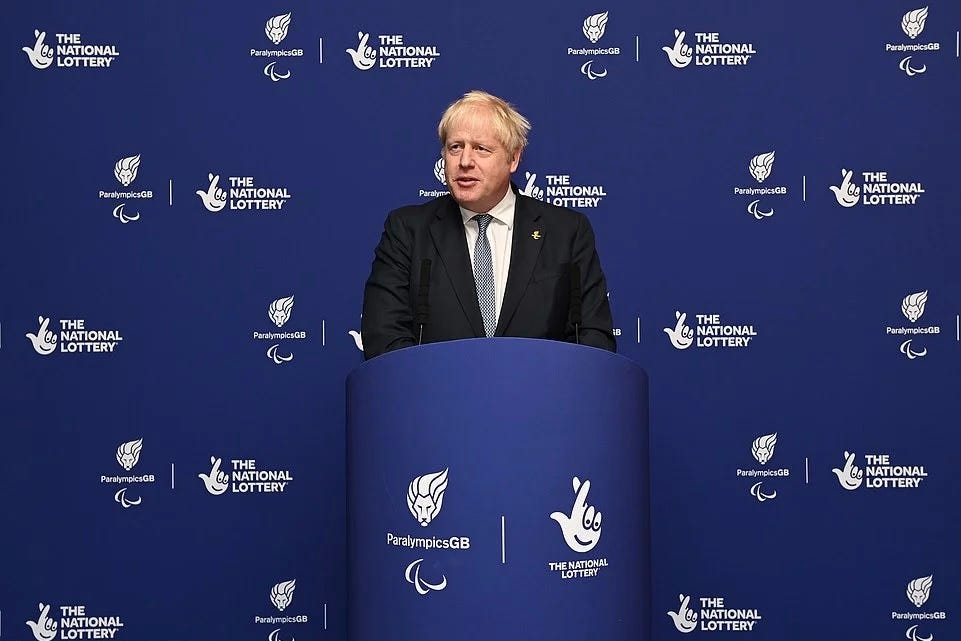The golden streamers have been swept away from the Wembley Arena floor. Madness have packed up their saxophone. The National Lottery logos have been put back into storage. ParalympicsGB’s Homecoming event on Sunday bookended an exhilarating Tokyo summer for British athletes.
After GB’s wheelchair rugby gold I promised to return to lessons learned from UK Sport’s denial of funding after Rio, once the dust had settled on Tokyo. With only three years to Paris, time is short for UK Sport to finalise its investment strategy. But it’s not too late to make vital tweaks to the medal machine.
Beth Shriever’s BMX gold at the Olympics was fuelled by a crowdfunding campaign because UK Sport decided to fund only male BMX racers after Rio. GB wheelchair rugby turned to individual donors and philanthropic businesses to get our team on court in Tokyo. Both Shriever and our rugby stars proved it is possible to thrive outside a system that can be bureaucratically stifling. How, then, to blend freedom of action with the benefits of lottery support?
"My rivals who are all around the world are doing this full time and are funded, so I'm the only one who's not really getting much help. It is worrying and I don't want my dream to compete at Tokyo to be taken away just because of money." Beth Schriever launching her crowdfunding campaign in 2019
I’d like to see the following adjustments to UK Sport’s funding system. And before you cry ‘unaffordable!’, in my experience the bigger Olympic sports simply don’t need the scale of funds that they receive. Force them to exist on thinner rations and you’d likely find their performance actually enhanced as they focus more intensely on what is really essential.
Firstly, ensure a core level of funding for the performance programmes of every Olympic and Paralympic sport, with an ambition for Britain to qualify teams in every sport by Los Angeles 2028. Not all of that investment will bear immediate fruit - but consistent support will succeed in time.
Top of my wish list are goalball - a Paralympic sport for the visually impaired - and basketball. The first has a decent chance of getting teams to Paris but needs more investment. Basketball, as I know to my cost after an inglorious few weeks in the sport’s vipers’ nest, is a tougher challenge. In my brief stint as interim chair of British Basketball I couldn’t find anyone in authority who seemed to care about GB teams. But the social value of making the Olympics in such a popular inner city sport would be huge. Qualifying both men’s and women’s teams for LA must be the ambition.
Next, UK Sport should be confident in devolving more power to individual sports to craft performance systems based on their own experience. At present, there is a tendency to demand conformity to idealised structures, and to second guess governing bodies in the interpretation of data on ‘what it takes to win’ (a favourite UKS phrase) in each sport.
Of course governing bodies don’t always know best, and should be subject to challenge, but too often they are forced into sub-optimal decisions in order to secure funding when it would be better to leave them to their own devices. In short, trust in an intelligence and ambition rooted in the knowledge within sports that can’t be matched from the outside.
Thirdly, weaken the hand of UK Sport’s board in the funding process. I’ve nothing against any individual board member, but there is a strong sense that sports politics plays too big a role in the final allocation of funds. Yes, the board needs to endorse the recommendations of UKS’s performance analysts and accountants, but it should merely be looking out for egregious injustices, nothing more.
Only two of the twelve current UK Sport board members are elite athletes. None are elite coaches or performance specialists
Finally, grasp the nettle of discrimination against Paralympic sport. As I highlighted a few weeks ago, the spending behind Britain’s Paralympians is more than 70% lower per head than supports our Olympians. The Prime Minister promised a hefty increase in investment in disability sport before the Homecoming event. That might be a start (let’s wait to see the detail). But we shouldn’t rest until there is genuine equality.
So there you have it: baseline funding for all sports, empower them don’t direct them, leave key decisions to the experts, and level up our Paralympians.
£33,333 a post
There’s been an unsurprising flurry of analysis of Emma Raducanu’s earning potential after her stunning US Open victory. Standout for me was the expert in The Times suggesting she could earn £100,000 for three product endorsements on Instagram. Fantastic if true. And puts Team GB and ParaGB funding in perspective - that’s more per Insta post than the maximum annual lottery funding an athlete can be granted.
Tennis, as it happens, is currently the only route to financial superstardom for women in sport. The 2021 Forbes sports rich list has just two women in its top 50 earners - Naomi Osaka at 12th and Serena Williams 28th.
Cricket overdose
Two days before India’s cricketers pulled out of the deciding Test, the ECB announced next summer’s schedule for the England team. It comprises 42 days cricket across 103 days with three different opponents. And the ECB now wants to shoehorn in a test against India to make up for the Old Trafford blank. Whatever financial hole this week’s cancellation has created - and even allowing for differing red-ball and white-ball squads - is another five days really what England’s cricketers and the public need?




